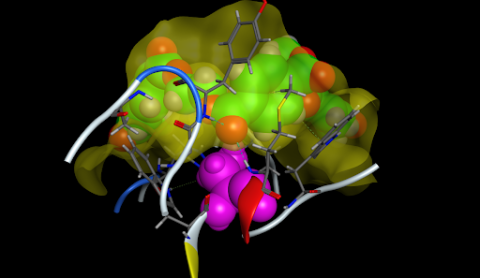

Theory, Modelling and Drug Design research
Discover how our research identifies new drug molecules and improves drug design
Our research applies molecular modelling methods to a wide range of chemical and biological areas. Computer simulations are used to help solve the structure of complex catalytic materials, including both biological enzymes and solid-state catalysts. Modelling allows us to improve our understanding of these materials and design improved ones.
We also use a combination of theory and experiments to optimise the use of mesoporous and microporous materials for the controlled release of drugs. Our studies allow us to design an ideal carrier for specific drugs to enhance their efficacy. We also use range of modelling techniques to investigate the structure and properties of enzymes and proteins. In addition, we use computational high-throughput screening methods to identify new drug molecules for experimental investigation.
Current research topics
- Drug Design
- Solid-state Catalysis
- Microporous Materials for Drug Delivery
- Plastic degrading enzymes
Collaborations
- Sussex Drug Discovery Centre, University of Sussex
- Johnson Matthey
- University of Bath
- Unilever
- University of St Andrews

A trimer of PET polymer docked in the active site of PETase.
Publications highlights
-
Combining theoretical and experimental methods to probe confinement within microporous solid acid catalysts for alcohol dehydration
Potter, M. E., Amsler, J., Spiske, L., Plessow, P. N., Asare, T., Carravetta, M., Raja, R., Cox, P. A., Studt, F. and Armstrong, L-M., (2023), "Combining theoretical and experimental methods to probe confinement within microporous solid acid catalysts for alcohol dehydration", ACS Catalysis.
-
Sourcing thermotolerant poly(ethylene terephthalate) hydrolase scaffolds from natural diversity
Erickson, E., Gado, J. E., Avilan, L., Bratti, F., Brizendine, R. K., Cox, PA., Gill, R., Graham, R., Kim, D-J., Koenig, G., Michener, W. E., Poudel, S., Ramirez, K. J., Shakespeare, T. J., Zahn, M., Boyd, E. S., Payne, C., DuBois, J. L., Pickford, A. R., Beckham, G. T., and 1 others, (2022), "Sourcing thermotolerant poly(ethylene terephthalate) hydrolase scaffolds from natural diversity", Nature Communications.
-
Zero-order and prolonged release of atenolol from microporous FAU and BEA zeolites, and mesoporous MCM-41: experimental and theoretical investigations
Wise, A. J., Sefy, J. S., Barbu, E., O'Malley, A. J., van der Merwe, S. M. and Cox, P. A., (2020), "Zero-order and prolonged release of atenolol from microporous FAU and BEA zeolites, and mesoporous MCM-41: experimental and theoretical investigations", Journal of Controlled Release.
Research groups
-
Advanced Materials for Diagnosis and Therapy Research Group
We're researching the bioactive molecules and biocompatible materials for their potential use as drug carriers, bioadhesives, surgical implants and more.
Discover our areas of expertise
Theory, Modelling and Drug Design is one of areas of expertise in the Pharmacy, Pharmacology and Biomedical Sciences research area. Explore the others here.
Nanomaterials for Drug and Gene Delivery
We're helping to create targeted, safe and effective medicines to positively impact patients' lives.

Diagnostics
We develop novel technologies for disease diagnosis at an early pre-symptomatic stage using a synergistic combination of gold nanostructures and unique Raman spectroscopic techniques

Biomaterials for tissue engineering
We work at developing products that will be used in the repair of damaged tissue, in particular cartilage, bone, tendons and muscles.

Clinical Microbiology
We're researching how microbes can cause infectious diseases and benefit human health, and tackling antibiotic resistance by identifying new molecules in pathogenic microbes.

Interested in a PhD in Pharmacy, Pharmacology and Biomedical Sciences?
Browse our postgraduate research degrees – including PhDs and MPhils – at our Pharmacy, Pharmacology and Biomedical Sciences postgraduate research degrees page.


